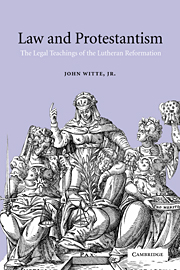Book contents
- Frontmatter
- Contents
- List of illustrations
- Foreword by Martin E. Marty
- Acknowledgments
- List of Abbreviations
- Introduction
- 1 Canon law and civil law on the eve of the Reformation
- 2 Loving thine enemy's law: The Evangelical conversion of Catholic canon law
- 3 A mighty fortress: Luther and the two-kingdoms framework
- 4 Perhaps jurists are good Christians after all: Lutheran theories of law, politics, and society
- 5 From Gospel to Law: The Lutheran reformation laws
- 6 The mother of all earthly laws: The reformation of marriage law
- 7 The civic seminary: The reformation of education law
- Concluding reflections
- Bibliography
- Index
Foreword by Martin E. Marty
Published online by Cambridge University Press: 17 November 2009
- Frontmatter
- Contents
- List of illustrations
- Foreword by Martin E. Marty
- Acknowledgments
- List of Abbreviations
- Introduction
- 1 Canon law and civil law on the eve of the Reformation
- 2 Loving thine enemy's law: The Evangelical conversion of Catholic canon law
- 3 A mighty fortress: Luther and the two-kingdoms framework
- 4 Perhaps jurists are good Christians after all: Lutheran theories of law, politics, and society
- 5 From Gospel to Law: The Lutheran reformation laws
- 6 The mother of all earthly laws: The reformation of marriage law
- 7 The civic seminary: The reformation of education law
- Concluding reflections
- Bibliography
- Index
Summary
Millions of people have only one eye, and still can see rather well. Some of them wear an eye-patch over the blind orb. Others with only one good eye in rare instances choose to work an effect by wearing a monocle to improve their vision and express style. For all the adjustments such improvisers make, it is hard to picture any of them – any of you, because you may be a reader of this book – preferring monocular to binocular vision.
If what I have just described is the case in the literal world of seeing, so it often is in the figurative or metaphorical world that John Witte inhabits. It is a world he would have readers share on the pages that follow. Borrowing the concept of “binocular vision” from historian of doctrine Jaroslav Pelikan, Witte asks not so much what are we to see but through what lenses should we look.
In the present case, his subject combines the two determinative subjects of “law” and “theology” in the case of sixteenth-century reformers within the Christian community in the lands that make up much of modern Germany. Too many historians, he notes, look through only the lens of law or the lens of theology when dealing with these conjoined topics. Fine, in some circumstances, but when a scientist looks through a microscope, only one eye gets put to work.
- Type
- Chapter
- Information
- Law and ProtestantismThe Legal Teachings of the Lutheran Reformation, pp. x - xvPublisher: Cambridge University PressPrint publication year: 2002



